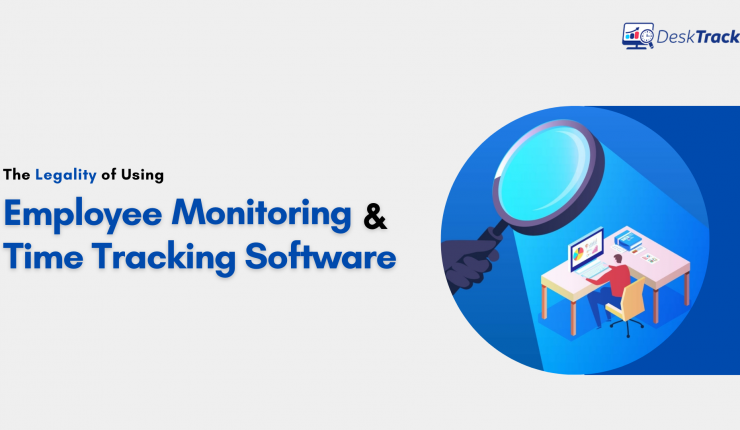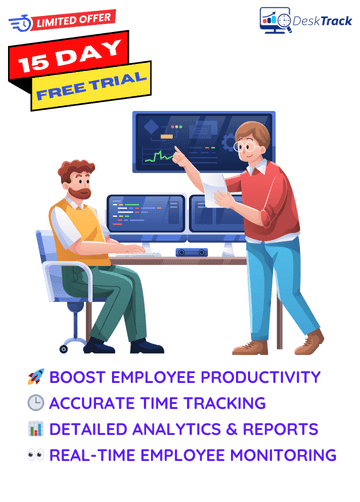
Employee monitoring in a hybrid work environment is an issue that needs deep consideration. Given the increase in the adoption of remote working modes, companies have been forced to reconsider methods to measure employee productivity.
Every country and state has its labor laws that companies and employers need to comply with. In the blog, we will attempt to understand the legality of Using Employee Monitoring Software & Time Tracking Software.
Disclaimer: The blog attempts to share information available in the public domain. It shouldn’t be constituted as a piece of legal advice.
Employee productivity monitoring isn’t new. The use of manual clock-in swipes, security cameras, and GPS tracking have been around for ages.
The Employee Monitoring Policies and the resultant privacy concerns is best explained using a few countries as an example.
What is Employee Workplace Privacy?
Employee privacy in the workplace refers to an employee’s right to keep their personal life separate from their work life. It includes the right to keep personal information confidential and the right to conduct personal activities during non-working hours. Workplace privacy also includes the right to be free from unreasonable searches and seizures by an employer.
Employee Monitoring Laws and Regulations
We will discuss the employee monitoring laws and regulations that organizations need to comply with to ensure they are not violating the privacy of their employees.
1. Federal Laws
A. Electronic Communications Privacy Act (ECPA)
Federal law that regulates the intercepting and watching of electronic communications is known as the Electronic Communications Privacy Act (ECPA). Without the employee’s permission, the ECPA forbids the interception of any electronic communications, including emails, instant messages, and other types of electronic communication.
B. Computer Fraud and Abuse Act (CFAA)
The Computer Fraud and Abuse Act (CFAA) is a federal law that prohibits unauthorized access to a computer system or network. It is illegal for an employer to access an employee’s computer or network without their permission.
2. State Laws
In addition to federal laws, there are also state laws that govern employee monitoring. These laws vary from state to state, and organizations must comply with the laws in the states where they operate.
A. California Privacy Laws
California has some of the most comprehensive privacy laws in the country, including the California Consumer Privacy Act (CCPA) and the California Privacy Rights Act (CPRA). These laws provide employees with certain rights to control the use of their personal information, including their data collected during employee monitoring.
B. New York Privacy Laws
New York has several laws that regulate employee monitoring, including the New York State Labor Law and the New York Human Rights Law. These laws protect employees from discrimination and prohibit employers from monitoring employees’ private conversations and personal communications.
Workforce Monitoring Policies in the USA
Employees in the USA have the legal right to monitor the use of computers provide by the employer as it is their own property, according to the Electronic Communications Privacy Act (ECPA) of 1986. It is worthwhile to note that no federal law exists that mandates employers to notify employees that their activities are monitored on company-provided electronic devices.
However, does the ECPA infringe upon the rights to employees privacy? The ECPA contains certain parameters that protect the employee privacy in the workplace. For instance, the ECPA prohibits the intentional interception of oral, electronic, and wire communication unless an exception is warranted. Known as the Business Motive Exception, it allows employees to monitor the oral and electronic communication of the employees only if it was done for legitimate business reasons. An example would be recording the calls between a customer and a bank representative to prevent complicated situations in the future.
Furthermore, since the law in the US varies by state, some states require employers to disclose the use of employee tracking software whereas, in other states, the use of time tracking software is allowed without the explicit consent of the employees.
Employee Monitoring Laws in India
The Employment and Labour Law of India states that an employer can monitor employee activities such as SIM card usage, computer usage, and the use of other company assets. The reasoning is to protect sensitive and proprietary information about the company. However, employee monitoring or time tracking should not infringe upon employee privacy in the workplace. There is, however, no clarity on whether employees should be notified about monitoring or not.
Let’s Look at Employee Monitoring Policies Couple of Other Countries
Employee Monitoring Policies in the EU
As deemed by the European Court of Human Rights, companies need to adhere to the General Data Protection Regulation (GDPR) laws that require them to provide prior notice to the employees for monitoring their online communications. The employees need to consent to tracking and monitoring.
However, there is an exception too. If the company performs a legitimate interest assessment and is able to prove beyond doubt that there is a need to monitor data without the consent of employee/s, then they can install tracking provisions.
In an online space, businesses continuously face the threat of breaches, identity theft, takeovers, and tough compliances. To address this predicament problem we can use key ID Verification Services
Employers also need to perform a workplace Privacy Impact Assessment activity before implementing any Employee Monitoring Software to determine and mitigate any challenges resulting from the installation of such software.
Lastly, the GDPR law applies to any and all companies operating in the European Union, even if they are registered outside the European Union but have employees within.
Employee Monitoring Policies in Australia and Canada
Both the countries are clubbed here as their employee monitoring laws are fairly simple. Laws require employers to disclose the use of tracking, monitoring, and surveillance measures well in advance. Not all Australian states have surveillance laws and employees are required to notify at least 14 days in advance. In Canada, details of employee pay and benefits should not be disclosed and the collection of formal/informal files or the collection of keystrokes cannot happen without the knowledge and consent of the employees.
Is Using Employee Monitoring Really Necessary?
Yes, to put it bluntly! The logic is really simple – any company needs to ensure that their employees aren’t wasting the resources of the company. It isn’t akin to spying; managers need to monitor productivity and scale the resourcefulness of the entire team. Other benefits include:
- It helps employees and managers to manage their duties and workload better.
- Improved time tracking software helps to comply with budgetary restrictions.
- It allows the employers to review individual and team performances, and decide the next course of action.
- Employee Monitoring simplifies the payroll process, especially in contractual or freelancing positions.
- It builds individual employee accountability, eliminating the need to micromanage by the managers.
- A timesheet software saves time and money for the employer.
Conclusion
The use of time tracking software is increasingly necessary for a hybrid working environment. Kindly check with the labor laws and privacy laws of your country before deciding upon the use of employee monitoring software.
Our DeskTrack Employee Monitoring Software is legally compliant and doesn’t infringe upon the workplace privacy of any team member.



